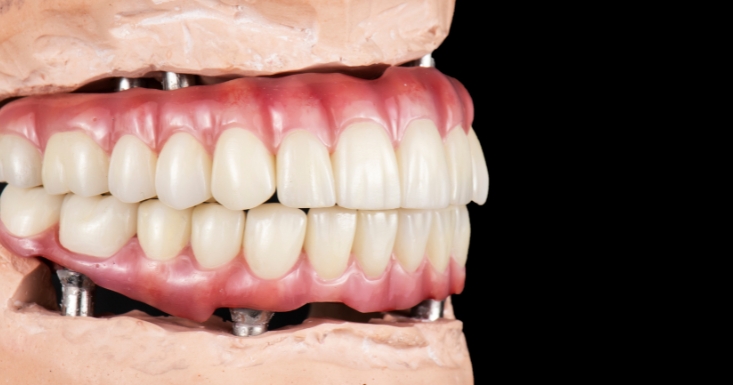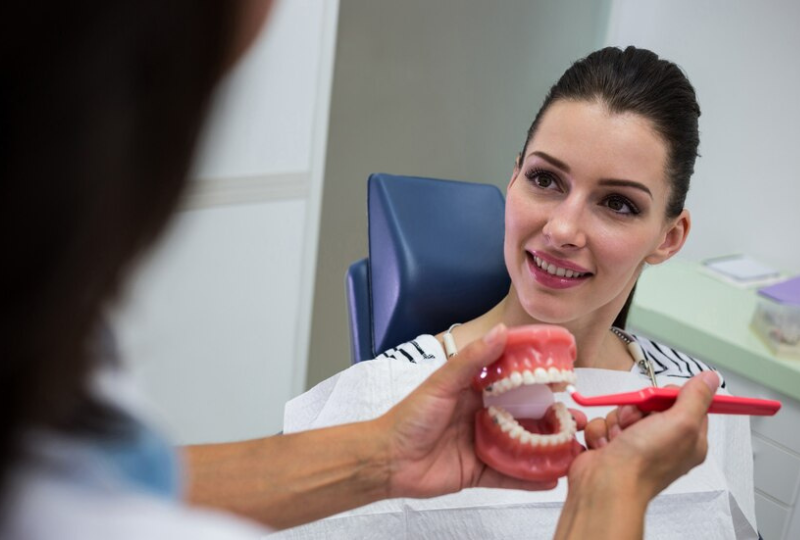732.751.4028

Hey there, smile seekers! If you’re a senior looking to rejuvenate your grin but don’t want to break the bank, partial dentures might be your perfect solution. Let’s dive into the world of partial dentures and discover how they can be a game-changer for your smile. From understanding what they are to finding the right fit, we’ve covered you with all the cool and crucial details.
What Are Partial Dentures? The Basics You Need to Know
So, what’s the deal with partial dentures? Simply put, they’re removable dental appliances designed to replace one or more missing teeth. They’re perfect if you’ve lost some natural teeth but still have a few healthy ones left. Think of them as a stylish upgrade to your smile—bringing back the functionality and look of your pearly whites.
Key Features:
- Custom Fit: Made to fit the particular tooth structure and shape of your mouth.
- Detachable: Simple to remove for sanitizing or taking a breather.
- Reasonably priced: An economical choice for people who require a few lost teeth replaced.
Why Choose Partial Dentures? The Perks for Seniors
If you’re wondering why partial dentures might be your best bet, let’s break it down. They offer a variety of benefits that can help you regain confidence and functionality.
Benefits of Partial Dentures:
- Restored Functionality: Chew and speak easily, just like your natural teeth.
- Improved Aesthetics: Get back that full, beautiful smile and avoid the gap-toothed look.
- Affordable Solution: Less expensive compared to other tooth replacement options like implants.
- Ease of Maintenance: Simple to clean and care for—no need for complex procedures.
Types of Partial Dentures: Which One’s Right for You?
Not all partial dentures are created equal. Here’s a quick rundown of the different types to help you choose the best fit for your needs.
Acrylic Partial Dentures:
- What They Are: Made from acrylic resin, these dentures are a common and cost-effective choice.
- Pros: Lightweight, affordable, and easy to adjust.
- Cons: It may not be as durable as other materials and might need to be replaced sooner.
Metal Partial Dentures:
- What They Are: Made from a combination of metals and acrylic, these are known for their durability.
- Pros: Strong, long-lasting, and often less bulky.
- Cons: It can be more expensive and might feel a bit heavier.
Flexible Partial Dentures:
- What Kind of Things Are They? These dentures fit more comfortably since they are made of flexible plastic.
- Advantages: More natural-looking, comfy, and lightweight.
- Cons: It may not be appropriate in all situations and may be more expensive.
The Fitting Process: What to Expect?
Getting partial dentures involves a few steps, but don’t worry—it’s easier than you might think. Here’s a sneak peek into the process so you know what to expect.
Step-by-Step Guide:
- Initial Consultation: Your dentist will check and examine your mouth and discuss your options. They’ll also take impressions of your teeth to create a custom mold.
- Fitting and Adjustments: Once your partial dentures are ready, you’ll try them on to ensure they fit comfortably and make any necessary adjustments.
- Final Touches: After any tweaks, your dentist will make sure everything is just right. You’ll get tips on caring for your dentures and what to expect in the first few weeks.
Caring for Your Partial Dentures: Tips for Longevity
Regular dental care and maintenance are key to keeping your partial dentures in top shape. Here are some tips to help you keep your smile sparkling and dentures in tip-top condition.
Maintenance Tips:
- Clean Every Day: Use denture cleaning and a gentle brush to clean your dentures. Regular toothpaste can be excessively abrasive, so stay away from using it.
- Rinse After Eating: To remove food particles, rinse your dentures with water.
- Soak: To keep your dentures clean and fresh, soak them in a denture-cleaning solution for the entire night.
- Frequent Check-Ups: Visit your dentist in Howell, NJ, regularly to ensure that your dentures fit properly and to adjust them as needed.
Overcoming Common Challenges: What to Watch Out For?
While partial dentures are a fantastic solution, there are a few common challenges you might encounter. Knowing what to expect can help you navigate these bumps in the road.
Potential Challenges:
- Adjusting to New Dentures: It might take a little time to get used to eating and speaking with your new dentures. Stick with softer foods and practice speaking to ease the transition.
- Discomfort: Some initial discomfort is normal, but if it persists, consult your Howell dentist for adjustments.
- Care Requirements: Regular cleaning and care are essential to prevent bad breath and infections.
Why Partial Dentures Are a Top Pick for Seniors?
Partial dentures are often a top choice for seniors looking to restore their smiles without breaking the bank. They offer a perfect balance of affordability, functionality, and aesthetics, making them a stellar option for anyone needing to replace a few missing teeth.
Partial dentures provide a flexible, cost-effective way to get back to smiling with confidence. They’re easy to maintain and can significantly improve your quality of life. If you’re considering partial dentures, contact Partial Dentures, Winchester, for a consultation and start your journey to a more radiant smile today!
Frequently Asked Questions:
1. What are partial dentures?
They’re removable replacements for missing teeth, designed to fill gaps and restore your smile.
2. Why choose partial dentures?
They’re affordable, effective, and customizable, making them a solid option for seniors who need to replace a few teeth.
3. How do I know if they fit well?
A good fit should be comfortable and secure. If you feel discomfort or see gaps, visit your dentist for adjustments.
4. What types of partial dentures are available?
You can choose from acrylic, metal, or flexible types—each with its own benefits for comfort and durability.
5. How should I care for my partial dentures?
To keep them fresh and functional, clean them daily with a soft brush, rinse after meals, and soak them overnight.
6. Will it take time to adjust?
Yes, you might need a few weeks to get used to eating and speaking with them. Patience and practice help!
7. Can partial dentures be adjusted?
Absolutely! Your dentist can fine-tune them for a perfect fit and address any issues.
8. How long do partial dentures last?
With proper care, they can last for several years. Regular check-ups will help ensure they remain in good condition.
9. Will partial dentures affect my speech?
There may be a brief adjustment period, but most people adapt quickly and resume normal speech.
10. Are partial dentures a good option for seniors?
Yes, they’re a practical and affordable solution to restore your smile and functionality.




